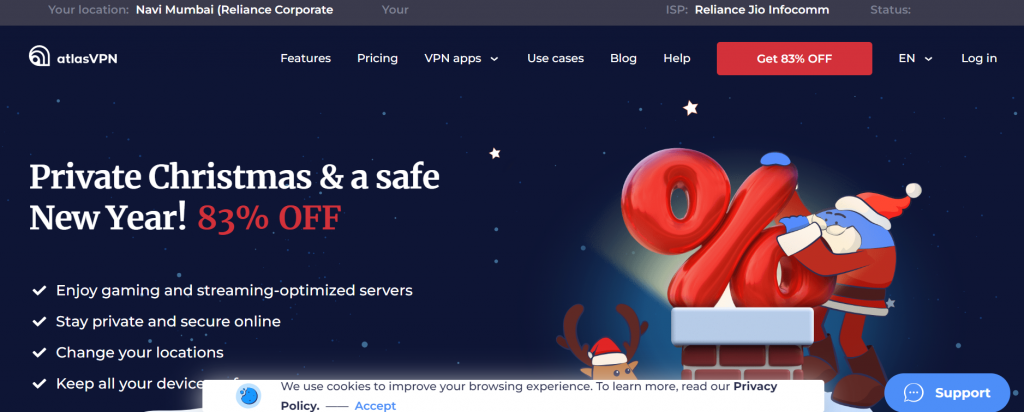If you’re not using a VPN, you should be. VPNs offer a number of benefits for businesses, including increased security, privacy, and flexibility. In this blog post, we’ll explore the benefits of VPNs and how they can help your business. From protecting your data to expanding your reach, read on to learn more about why every business should be using a VPN.
What is a VPN?
A VPN, or Virtual Private Network, is a private network that encrypts and transmits data while it travels from one place to another. A VPN is created by establishing a virtual point-to-point connection through the use of dedicated connections, virtual tunneling protocols, or traffic encryption.
A VPN provides many benefits for businesses, including the ability to keep data secure and confidential, as well as providing a way to bypass internet censorship and restrictions. By using a VPN, businesses can also improve their online security and protect their employees from potential cyber threats.
How Does a VPN Work?
When you connect to the internet, you’re assigned an IP address. This is a unique number that identifies your device and allows others to track your online activity. However, when you use a VPN, your traffic is routed through a server before it reaches the internet. This server assigns you a new IP address, which makes it difficult for others to track your activity. Additionally, all of your data is encrypted when it passes through the server, making it impossible for anyone to interception and read your information.
The Many Benefits of Using a VPN
A VPN, or virtual private network, is a secure tunnel between two or more devices. VPNs are used to protect private web traffic from snooping, interference, and censorship. A VPN encrypts your web traffic and routes it through an intermediary server, making it difficult for anyone to identify or track you.
There are many benefits of using a VPN, including:
– Improved security: A VPN encrypts your web traffic, making it more difficult for hackers or other third parties to intercept your data.
– Bypassing geo-restrictions: Many VPN providers offer servers in multiple countries, allowing you to bypass geo-restrictions and access content that would otherwise be unavailable in your country.
– Anonymous browsing: By routing your traffic through a VPN server, your identity and location can remain anonymous. This can be useful for accessing certain websites or avoiding targeted advertising.
– Enhanced privacy: In some cases, using a VPN can improve your privacy by preventing your ISP from tracking your online activity. Additionally, some VPN providers offer features like ad blocking and malware protection that can further improve your privacy while online.
The Different Types of VPNs
A VPN, or Virtual Private Network, is a secure tunnel between two or more devices. A VPN can be used to protect your privacy online, encrypt your traffic, and hide your IP address. There are many different types of VPNs, each with its own benefits.
The most common type of VPN is the traditional IPsec VPN. This type of VPN uses the IPsec protocol to create a secure tunnel between two or more devices. IPsec is a proven and mature technology that has been used for many years to securely connect networks.
Another popular type of VPN is the SSL VPN. SSL stands for Secure Sockets Layer and is a protocol that is used to encrypt traffic. SSLVPNs use the SSL protocol to create a secure tunnel between two or more devices. SSLVPNs are often used by organizations to allow remote access to their internal network.
How to Set Up a VPN
A VPN, or Virtual Private Network, is a private network that encrypts and transmits data while it travels from one point to another. A VPN can be used to connect to a variety of different networks, including the Internet, a company’s private intranet, or a public hotspot.
To set up a site-to-site VPN connection, you will need two routers that are compatible with each other and have IPsec capabilities. You will also need to configure both routers with the same settings. To set up a client-to-site VPN connection, you will need a router that has IPsec capabilities and an Internet connection. You will also need to configure your router with the correct settings for your particular VPN service.
Choosing the Right VPN Provider
There are a lot of different VPN providers out there, and it can be tough to know which one to choose. Here are a few things to look for when choosing a VPN provider:
-Make sure the provider has servers in multiple countries. This will give you the most flexibility in terms of where you can connect and what kinds of content you can access.
-Check the provider’s security features. Make sure they offer encryption and other security measures to keep your data safe.
Our Recommendation: AtlasVPN
There are plenty of reasons to use a VPN, but for businesses, the most important reason is security. A VPN can help protect your company’s data from being hacked or stolen by encrypting all of the traffic between your devices and the VPN server. This means that even if someone were to intercept your data, they would not be able to read it.
Another benefit of using a VPN is that it can help you bypass censorship and firewalls. If your country has strict internet regulations, a VPN can help you access websites and content that you wouldn’t be able to otherwise.
AtlasVPN is our top choice for businesses looking for a VPN solution. AtlasVPN offers military grade encryption, which is perfect for businesses who want to keep their data safe. Additionally, AtlasVPN has servers in over 50 countries, so you can always find a fast and reliable connection no matter where you are in the world.
Founded in 2019, Atlas VPN is a highly secure freemium VPN service with a goal to make safe and open internet accessible for everyone. In 2021, Atlas VPN became part of Nord Security — a leader in providing digital security and privacy solutions. While relatively new to the VPN scene, we are already trusted by more than 6 million users across the world.








